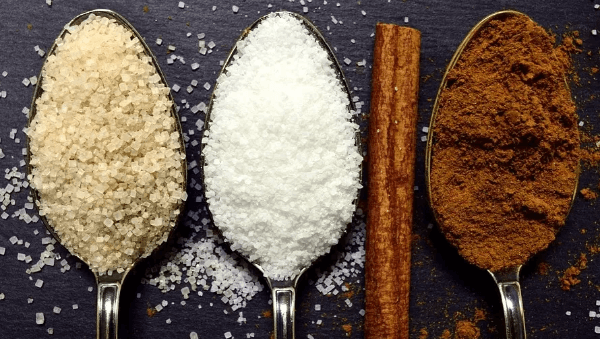Recently, the market research agency Spins released the sales data of major sweeteners in the U.S. market in the past year, as well as the use of sweeteners by sub-categories. Which sweeteners saw higher growth last year? Which sweeteners are trending in the food and beverage sub-categories? What factors will further drive the sweeteners market? This article will give you the answer.
Natural sweeteners are highly regarded
According to the latest report from Values Reports, the global natural sweeteners market is expected to grow from $22.49 billion in 2020 to $27.94 billion by 2026, at a CAGR of 3.7%. Out of consideration for natural health, both consumers and businesses are increasingly leaning towards natural sweeteners and avoiding artificial sweeteners. Among the main sweeteners, Luo Han Guo achieved a market growth rate of 20% last year. The most used categories are protein supplements/meal replacements, frozen desserts, and bars and gels; the fastest-growing categories are refrigerated and plant-based yogurt, refrigerated entrees, and shelf-stable desserts.
Although it is still unpopular in the Chinese market where it originated, the Monk fruit sugar substitute has developed rapidly in the U.S. market in recent years. Compared with stevia, Luo Han Guo has no after-bitter taste and has a better taste, and can be used in combination with other sweeteners to optimize the taste; it also has obvious clean label advantages, and can be added in the form of Luo Han Guo powder, Luo Han Guo concentrated juice, etc. in food and beverages. The name of steviol glycosides on the food label is “steviol glycosides”, which is a food additive, and there are requirements for the scope and limit of use, but the monk fruit can be directly marked as “monk fruit /monk fruit juice” at home and abroad. ), can be used as a natural raw material in food and is not limited by the amount of addition.
Sugar alcohols saw 3% growth last year, with major application categories including oral care, confectionery, and functional beverages; the fastest-growing categories included no-cook cereals, refrigerated and plant-based yogurts, and frozen breakfasts.
Like the domestic situation, the products using sugar alcohols (mainly erythritol) as beverage sweeteners in the U.S. market are also growing rapidly, and have been well received by consumers for their highly similar taste to sucrose. Erythritol is sweet, cool and pure, without bad aftertaste, and can be used alone. In addition, erythritol has stable pH (suitable for pH 2-12), strong heat resistance, and will not decompose or change color at high temperature of 160 degrees, which can meet the processing requirements of various beverages. Moreover, compared with other sugar alcohols, erythritol is also more safe and intestinally tolerated.
In addition, with the popularity of the oral care market, sugar alcohols are also widely used in oral care functional foods. Tooth decay is mainly due to carbohydrates and sugars contained in food, which, when fermented, produce organic acids that destroy tooth enamel. The sugar alcohols will not be fermented and utilized by oral bacteria, and can promote saliva secretion and reduce tooth erosion.
Important application categories for sweeteners – beverages
Among various application categories, beverages are the fastest growing and larger market for sweeteners. Beverage companies are using sweeteners to drive product innovation and attract consumers with the concept of “zero sugar and zero calories”.
The data shows that coconut sugar is the fastest growing sweetener in beverages, with a growth rate of 21.1%, followed by sugar alcohols (20.6%), stevia (10.3%), no sweetener (1.3%), Luo Han Guo ( 1.3%).
Coconut sugar is extracted from the juice of coconut flowers. The entire extraction process of coconut sugar is very natural, gluten-free, additive-free, preservative-free, low in glycemic index, similar to caramel in taste and color, and can be 1: 1 Substitute for sucrose and blend better with rich flavors such as coffee, oatmeal, cocoa, roasting, etc.
NUMI Immune Support Herbal Tea fortified with antioxidants like organic pomegranate juice, elderberry juice, lemon juice, cinnamon and cayenne pepper, and sweetened with coconut nectar.
Of course, some beverages do not use sweeteners and use black technology to reduce sugar. CHobani High Protein Milk uses lactase for sugar reduction, which helps eliminate lactose and cut sugar in half, with 6 grams of sugar and 20 grams of protein per cup, compared to 12 grams of sugar and 8 grams of protein per cup of conventional milk.
Sugar substitute is a key innovative element in food and beverages
The data shows that in various applications, the market sales of sugar-free / sugar substitute products are growing rapidly. In jerky snacks, market sales of products using sugar substitutes increased by 50%, compared with a 14% overall growth rate for the category; in biscuit snacks, market sales of products using sugar substitutes increased by 26%, compared with the category The overall growth rate was 7%; in confectionery, market sales of products using sugar substitutes increased by 11%, compared with a 5% overall growth rate for the category.
In addition, American consumers’ respect for ketogenic and whole30 diets has further promoted the development of the sugar replacement market. In 2018, the global ketogenic food market was $970 million, and according to market research by The Insight Partners, the ketogenic market will grow at a CAGR of 5.5% to $1.564 billion by 2027, of which snacks and beverages will become The most important category of ketogenic products. Sugar substitute is a very important ingredient in ketogenic food. Stevia, monk fruit, erythritol, and allulose are the most commonly used sugar substitutes, and some products directly use coconut as sugar substitute.


